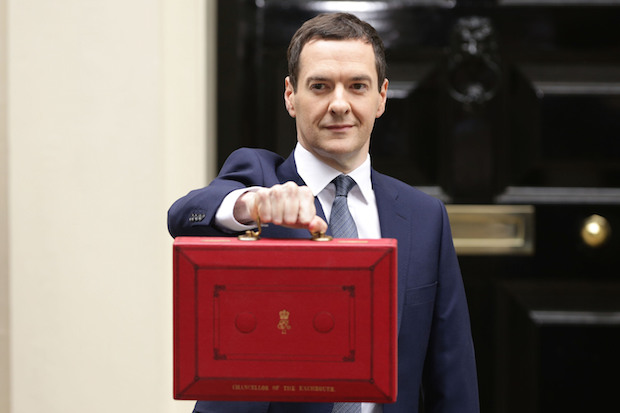With just a couple of days left before the Budget, it came as no surprise to find the weekend press brimming with speculation about the Chancellor’s red box. While George Osborne did the rounds of the Sunday TV shows, news of proposed spending cuts dominated the headlines.
The Observer devoted its front page to suggestions that Osborne is under pressure to shelve proposed tax cuts for higher earners. The Resolution Foundation thinktank called on the Chancellor to scrap this key Tory election pledge. Meanwhile, writing in The Sun on Sunday, Osborne appealed to its readers to ‘graft now, pay later’ but failed to go into any detail on policy.
And, speaking on the BBC’s Andrew Marr Show, the Chancellor reiterated his message that the UK has to ‘act now rather than pay later’. He said that spending cuts would be ‘equivalent to 50p in every £100’ of public spending by 2020, which was ‘not a huge amount in the scheme of things’. In an effort to shore up support before the Budget, he added that the world was ‘more uncertain’ than at any time since the financial crisis.
Also in the news over the weekend were reports of a rise in insurance tax. According to the insurance industry, Osborne is planning yet another rise in Insurance Premium Tax. In November, the tax was increased from 6 per cent to 9.5 per cent. Thee AA said that a further increase, to 12.5 per cent, would mean that the tax could be doubled in less than six months.
Meanwhile, a leading forecasting group warns today that government spending in the Budget will put Britain at risk of a downturn. In a report on the state of the economy, the EY Item Club said that the Chancellor must not engage in ‘bad economics’ by announcing further austerity measures to eliminate the deficit.
Whatever happens on Wednesday, this is shaping up to be a bleak Budget, especially compared to last year’s Autumn statement. And it’s unlikely that the Chancellor will be heartened by a study showing that despite the numerous savings and investment options available, almost a third of us still use a jar or tin to save – this is the fourth most popular method, according to research by financial firm SunLife.
But the government is doing its utmost to soften up the public before laying out swingeing spending cuts in the Budget (cuts of about £4 billion by the end of the decade have been reported in today’s Times). It announced today that millions of low-paid workers who put aside savings could receive a top-up of up to £1,200 over four years. Employees on in-work benefits, such as tax credits, who put aside £50 a month would receive a bonus of 50 per cent after two years – worth up to £600. That could then be continued for another two years with account holders receiving another £600.
On another topic, nearly half of those thinking of moving home within the next three years plan to downsize, according to new data provided by Lloyds Bank. Downsizing was cited as the single most popular factor for moving, as 46 per cent plan to move to a smaller property with their next move.
And on a day when TV show Top Gear was criticised for performing stunts near the Cenotaph, the British Insurance Brokers Association reports that the number of drivers with telematics car insurance policies has risen by 40 per cent in the past year. Under the terms of these policies, a black box is fitted to your car to monitor your driving in return for cheaper premiums for sticking to the road rules.
Finally, included in the Financial Advice Market Review released today by the Treasury and the Financial Conduct Authority is a recommendation that the City watchdog sets up a unit to help firms develop automated, or ‘robo’, financial advice. Rise of the robots? Watch this space.
Join The Spectator at the Budget Briefing with Andrew Neil, Fraser Nelson and James Forsyth.
16 March 2016 | The British Museum, Great Russell Street, London WC1B 3DG Book here.






Comments